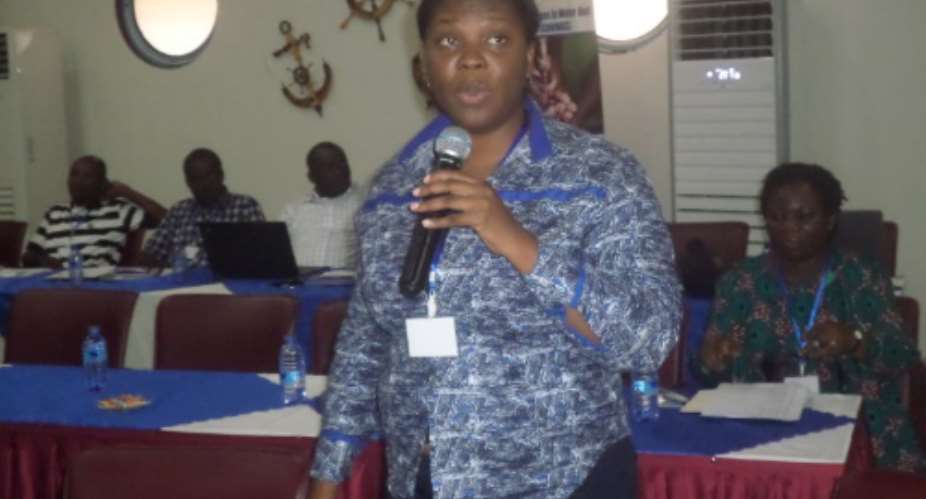The issue of governance has become fundamental in every human endeavor. Governance permeates every societal fabric including corporate institutions, nation building and the provision of essential social services such as WASH services. It was therefore no wonder that the issue of governance featured prominently at the 27th edition of the Mole Conference at Big Ada in the Greater Accra Region of Ghana.
Governance, according to WASH sector actors, remains a prominent feature that actors encounter in the sector and that they said is not limited to only the central Government, but also features prominently in the rural sub-sector in Ghana. Governance is also encountered at the local government level.
Contributing to discussions on Advocacy and Governance at the 27th Mole Conference, the Learning and Advocacy Manager of IRC Ghana, Ms. Veronica Ayi-Bonte said effective governance was required at the community level in the management of WASH system. “How well or not the communities manage these WASH systems will determine whether your facility will continue to work or how it will wane down and I think governance is important in order for our systems to be sustained.” Ms. Ayi-Bonte stressed.
She said recent works done in the WASH sector regarding WASH systems, has revealed that there are about 30,000 systems in the country, most of which are in the rural sub-sector and its being operated and managed by Community Based Organizations (CBOs), and WSMTs and effective governance is required to make these systems work.
According to Ms. Ayi-Bonte, Governance is required not just at the political level, but at the District Assembly and national level in order to ensure that the gains made so far can be consolidated.
“We realized that we do need strong Civil Society to improve governance, we are at different levels, we are everywhere, as we sit here, some of us work at the national level, some at the international level, some work at the regional level and district levels and some at the community level, and we need to be able to pull in all our efforts as one group of people in order to see the change at the various levels we are looking at,” Ms. Ayi-Bonte urged.
Within the partnerships, the IRC Ghana Learning and Advocacy Manager said stakeholders in the WASH sector need to understand how they work in the decentralized systems and to be effective, she said they need to integrate their efforts.
According to Ms. Ayi-Bonte, the greatest challenge in the WASH sector is the number of people who have not been reached with WASH services as a result of issues such as ground water problems, availability of water, difficult to reach areas, technology choices and explained further that all that are issues that made those areas difficult to live in and therefore called for concerted efforts to reach the unserved, and “that is what we do, and that is what CSOs should be doing, reaching the most people that people cannot see and we need to be able to build on that,” she emphasized.
On how to promote governance in the WASH sector in Ghana, Ms. Ayi-Bonte said it was important for WASH sectors to know who they are, define what their interests are and appreciate how the stakeholders can use each other in different circumstances to achieve the delivery of quality services.
“We all do different aspect of it, some of us do campaigns, some of us do advocacy, some of us are advisors, lobbyists, some of us negotiate, some of us are activists, we are from different spectrums, but the thing is, we need to know who we are, its important. We need to define what our interests are, because it will affect how we present ourselves and we need to know how we use each other in different circumstances,” Ms. Ayi-Bonte emphasized.
She said, IRC Ghana for instance worked mainly around government and with government and if it changed focus from one of advocacy to that of activism, that chances that it will lose its influence will be quite high.
Ms. Ayi-Bonte explained that there are other partners who were doing activism and doing it effectively, and therefore, partnering them to do it better was crucial.
Championing an evidence based advocacy was critical, stressing “sometimes we have the information, we are passionate, there are also people who are studying it and have different results, but we don’t necessarily link it on our advocacy activities.” She further call on all partners to sharpen their advocacy tools, work with the right partners to achieve the needed results.





 Saglemi Housing Project will not be left to rot – Kojo Oppong Nkrumah
Saglemi Housing Project will not be left to rot – Kojo Oppong Nkrumah
 Transport fares hike: GPRTU issue two-day ultimatum
Transport fares hike: GPRTU issue two-day ultimatum
 ARC endorses Alan as presidential candidate – Buaben Asamoa
ARC endorses Alan as presidential candidate – Buaben Asamoa
 Akufo-Addo appoints Kwasi Agyei as new Controller and Accountant-General
Akufo-Addo appoints Kwasi Agyei as new Controller and Accountant-General
 PNC dismiss reports of mass resignations
PNC dismiss reports of mass resignations
 PAC advocates for revenue collectors to be engaged on commission basis, not full...
PAC advocates for revenue collectors to be engaged on commission basis, not full...
 Genser Energy commissions 110km of natural gas pipeline at Anwomaso
Genser Energy commissions 110km of natural gas pipeline at Anwomaso
 Naa Torshie calls for tolerance, peace ahead of 2024 election
Naa Torshie calls for tolerance, peace ahead of 2024 election
 Asantehene commends Matthew Opoku Prempeh for conceiving GENSER Kumasi Pipeline ...
Asantehene commends Matthew Opoku Prempeh for conceiving GENSER Kumasi Pipeline ...
 Let’s do away with ‘slash and burn politics’ in Ghana — Dr Adutwum
Let’s do away with ‘slash and burn politics’ in Ghana — Dr Adutwum
